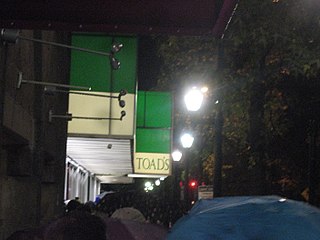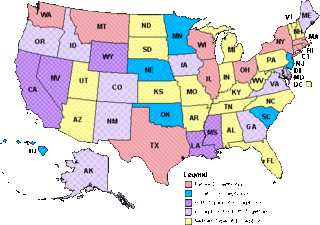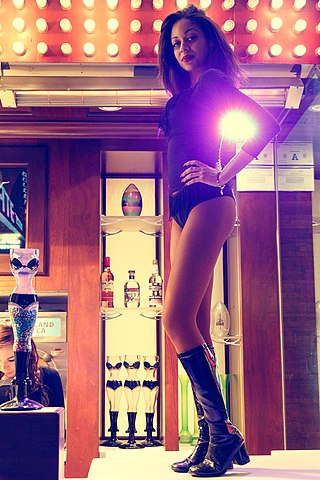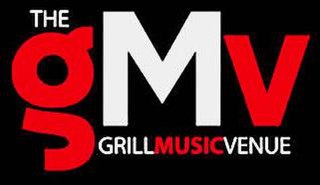
Nightlife is a collective term for entertainment that is available and generally more popular from the late evening into the early hours of the morning. It includes pubs, bars, nightclubs, parties, live music, concerts, cabarets, theatre, cinemas, and shows. These venues often require a cover charge for admission. Nightlife entertainment is often more adult-oriented than daytime entertainment. People who prefer to be active during the night-time are called night owls.

Gatecrasher is an international clubbing brand made famous by the "Gatecrasher" dance music events, which were held at the Republic nightclub in Sheffield, UK during the late 1990s and early 2000s. The promoters of the brand were Simon Raine and Simon Oates and, until 2004, Scott Bond. By August 2014, the only Gatecrasher venue remaining was located in the United Kingdom city of Birmingham. This venue was closed down permanently by the authorities on 25 November 2015.

Rock City is a music venue and nightclub located in Nottingham, England. It is owned by venue operator and concert promoter DHP Family.

The Licensing Act 2003 is an act passed by the Parliament of the United Kingdom. The act establishes a single integrated scheme for licensing premises in England and Wales used to sell or supply of alcohol, provide regulated entertainment, or provide late night refreshment. It allows some or all of these licensable activities to be contained in a single licence—the premises licence—that replaced other schemes. Responsibility for issuing licences is given to local authorities, specifically London boroughs, metropolitan boroughs, unitary authorities, and district councils, who took over this power from the justices of the peace under a system of licensing committees. It came into effect midnight, 24 November 2005.

The Otley Run is the name given to a pub crawl in Leeds, West Yorkshire. The popular route covers Far Headingley, Headingley and Hyde Park areas and commonly continues towards Leeds City Centre.

Toad's Place is a concert venue and nightclub located in New Haven, Connecticut.
The Holy City Zoo, which called itself "the comedian's clubhouse", was a small but influential comedy club in San Francisco that operated from the mid-1970s to the mid-1990s.

Alcohol consumption by youth in the United States of America, also known as underage drinking, is an umbrella term for alcohol consumption by individuals under the age of 18 in the country.

A bargirl is a woman who is paid to entertain patrons in a bar, either individually or, in some cases, as a performer. The exact nature of the entertainment varies widely from place to place; depending on the venue this can be individual entertainment ranging from light conversation to sexual services, or more public entertainment in the form of go-go dancing or striptease. Variants on the term include "B-girl", "hostess", and "juicy girl".
The Maritime Hall is a historic 3,000-capacity concert hall in San Francisco's South of Market neighborhood that operated from 1995 through 2001 as a popular music venue and nightclub. It was located at 450 Harrison Street at the Sailors Union of the Pacific building.

The Grill Music Venue, also known as The Grill, formerly The Golden Grill, was a nightclub located in Letterkenny, County Donegal, in Ulster, Ireland. Regarded as the unofficial Fianna Fáil headquarters, it has hosted Fianna Fáil party conventions and bingo sessions over the years. The complex housed six bars.

A drinking establishment is a business whose primary function is the serving of alcoholic beverages for consumption on the premises. Some establishments may also serve food, or have entertainment, but their main purpose is to serve alcoholic beverages. There are different types of drinking establishment ranging from seedy bars or nightclubs, sometimes termed "dive bars", to 5,000 seat beer halls and elegant places of entertainment for the elite. A public house, informally known as a "pub", is an establishment licensed to serve alcoholic drinks for consumption on the premises in countries and regions of British influence. Although the terms are increasingly used to refer to the same thing, there is a difference between pubs, bars, inns, taverns and lounges where alcohol is served commercially. A tavern or pot-house is, loosely, a place of business where people gather to drink alcoholic beverages and, more than likely, also be served food, though not licensed to put up guests. The word derives from the Latin taberna and the Greek ταβέρνα/taverna.

A nightclub is a club that is open at night, usually for drinking, dancing and other entertainment. Nightclubs often have a bar and discothèque with a dance floor, laser lighting displays, and a stage for live music or a disc jockey (DJ) who plays recorded music. Nightclubs tend to be smaller than live music venues like theatres and stadiums, with few or no seats for customers.
The King Mojo Club, often known as the Mojo, was a nightclub in Pitsmoor, Sheffield, South Yorkshire, England located at 555 Pitsmoor Road, that operated between 1964 and 1967.

The state laws governing alcoholic drinks in New Jersey are among the most complex in the United States, with many peculiarities not found in other states' laws. They provide for 29 distinct liquor licenses granted to manufacturers, wholesalers, retailers, and for the public warehousing and transport of alcoholic drinks. General authority for the statutory and regulatory control of alcoholic drinks rests with the state government, particularly the Division of Alcoholic Beverage Control overseen by the state's Attorney General.
Pregaming is the process of getting drunk prior to going out socializing, typically done by college students and young adults in a manner as cost-efficient as possible, with hard liquor and cheap beer consumed while in group.
The 2006 nightlife legislation in New York City was enacted on August 23, 2006 in response to violent crime involving nightclubs in the New York City area. One of the first measures to come about was a three-point plan proposed by New York City Council Speaker Christine Quinn in her August 8, 2006 memorandum.
Tramsheds may refer to a tram depot. It may also refer to:

Code is a nightclub in Sheffield, England. It is located on Eyre Street in Sheffield City Centre and plays contemporary chart music including pop, hip hop and R&B. Code has been voted Sheffield's Nightclub of the Year every year from 2016 to 2022; its main competitors are Corporation and The Leadmill.
Le Phonographique was a gothic nightclub located underneath the Merrion Centre in Leeds. Founded under the name the WigWam club, the venue's 1979 rebranding led to it becoming a location frequented by members of both the local post-punk and New Romantic scenes. Here, the two scenes collided and created the earliest phase of the goth subculture. It was the first goth club in the world, opening in 1979 and eventually closing in 2005. Disc jockeys at the club, such as Marc Almond, Anni Hogan and Claire Shearsby, would play gothic rock and dark wave music.












